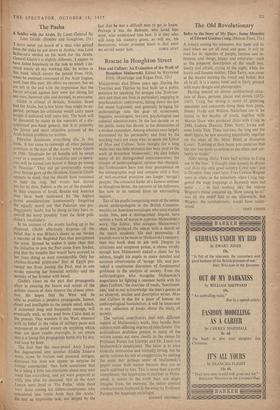The Pasha
A Soldier with the Arabs. By Lieut.-General Sir John Glubb. (Hodder and Stoughton, 25s.) 'I HAVE never yet heard of a man who gained from the stake he put down in Arabia,' was Lord Belhaven's verdict on his work for the Arabs. General Glubb's is slightly different. 'I appear to have failed hopelessly in the task to which I de- voted nearly all my working life,' he writes in this book which covers the period from 1939, When he assumed command of the Arab Legion, until June this year. He offers no excuses, but we are left in the end with the impression that the forces arrayed against him were too strong for one man, however able and devoted, to overcome.
Glubb is critical of Britain, America, Israel and the Arabs, but is less bitter than might be ex- pected; perhaps his criticisms would carry more Weight if delivered with more bite. The book will be dismissed by many as the memoirs of a dis- appointed pro-Arab general, but it is probably the fairest and most objective account of the Arab-Jewish problem yet written. Palestine dominates everything else in this book. 'It has come to outweigh all other political questions in the eyes of the Arabs,' wrote Glubb in 1946. `Gratitude for all benefits will be swept away in a moment. All friendship and co-opera- tion will be turned into hatred if things go wrong in Palestine.' They did go irretrievably wrong once Britain gave up the Mandate. General Glubb appears to think that we should have remained to hold the ring, but events had moved too far by then. Politics is the art of the possible. In their creation of Israel, Britain and America may have been motivated by 'the highest , moral considerations (conveniently forgetting the equally moral one that Palestine was pre- doMinantly Arab), but by doing so they have re- moved the word `possible' from the Arab poli- tician's vocabulary.
In his account of the events leading up to his dismissal, Glubb effectively disposes of the belief that it was Britain's desire to see Jordan a member of the Baghdad Pact that pretipitated the crisis. Instead he makes it quite clear that the initiative to join the Pact came from Jordan, and that the benefits that would have accrued to her from doing so were considerable. Only her chicken-hearted politicians' fear of Egypt pre- vented her from joining the Pact, and in one stroke ensuring her financial stability and the security of her frontier with Israel.
Glubb's views on the part that propaganda plays in swaying the hearts and minds of the gullible masses of Asia deserve the closest atten- tion. He hopes that the West will be able to produce a positive propaganda, honest, direct and intelligible to the simple mind, which, if reiterated long and frequently enough, will eventually stick, as the mud from Cairo does at the present. One wonders if the West, obsessed With its belief in the value of military pacts and Unprepared to spend money on anything which does not show results overnight, is yet aware that it is losing this propaganda battle day by day, and hour by hour.
The fact that the once-proud Arab Legion has degenerated into another Middle Eastern army, riven by faction and personal intrigue, distresses but does not appear to surprise its former commander. One feels sometimes that he is being a little too charitable about men who owed him everything, and yet were prepared to vilify him after his dismissal. Not all the Arab Legion were loyal to 'The Pasha,' while there were those among his fellow-countrymen who considered him 'more Arab than the Arabs.' He had an impossible task, not helped by the fact that he was a difficult man to get to know. Perhaps it was the Bedouin, who loved him most, who understood him best. It is they who will keep his memory green, as will we, his lieutenants, whose proudest boast is that once


































 Previous page
Previous page